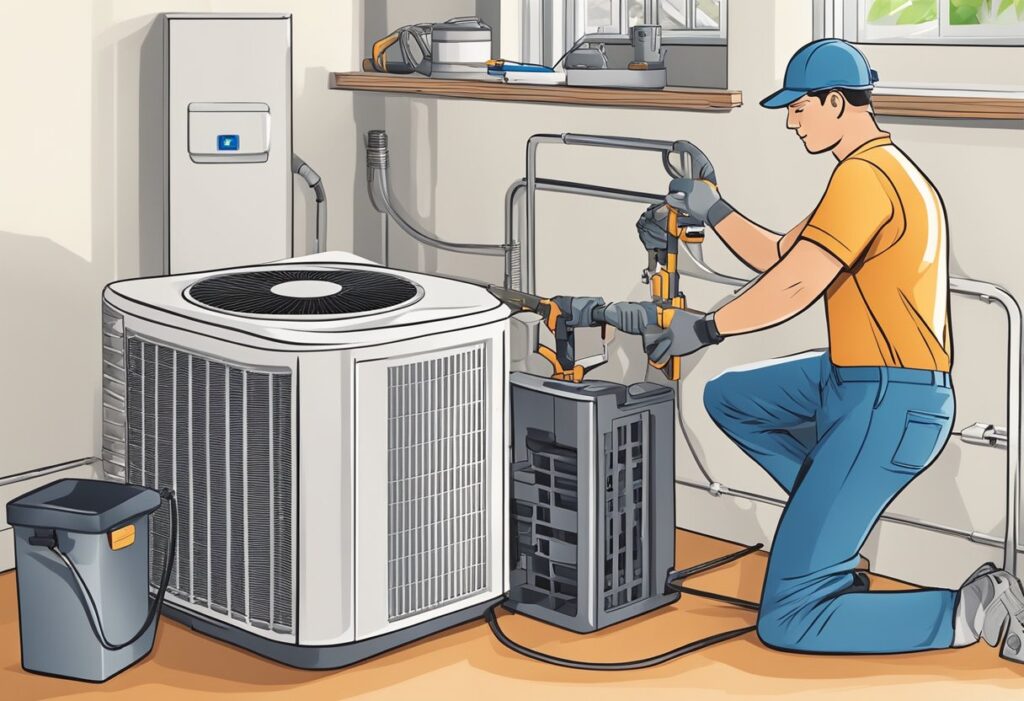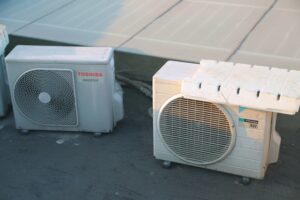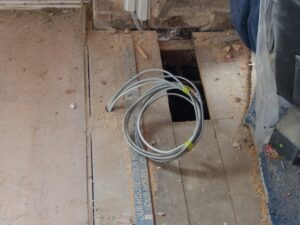When considering a new air conditioner, you might wonder if the cost is tax deductible. The answer lies in certain energy efficiency incentives.
You could potentially claim tax credits if you’re installing a qualifying energy-efficient system. For instance, air-source heat pumps could earn you credits for the installation costs. This generous deduction can ease the financial burden of upgrading your home.
Excel Mechanical stands out as the best choice for handling your air conditioning needs. With a focus on both quality and value, we ensure your system meets your specific needs and budget. Our experienced professionals offer expert consultation for both residential and commercial projects, making energy-efficient upgrades smoother for you.
If you’re aiming for efficiency and savings, our skilled team is ready to help. Understanding the benefits and tax incentives available can transform replacing an old system from a necessary expense into a valuable investment.
With our expert services, you can maximize the benefits while ensuring the comfort and energy performance of your home or business.
In this blog, we will cover:
- The eligibility criteria for AC replacement tax deductions
- How to qualify for energy-efficient tax credits
- Key types of deductions and how to claim them
Let’s get started!
Understanding AC Replacement Tax Deductions
When considering AC replacement, exploring the potential tax deductions available is crucial.
Knowing your eligibility and the types of deductions can help you manage costs effectively. This section provides insights into how you might benefit from tax deductions when replacing your AC system.
Eligibility for AC Replacement Tax Deductions
Your AC system must meet specific energy efficiency standards to qualify for tax deductions on AC replacements.
The Inflation Reduction Act 2022 introduced provisions for claiming tax credits if your AC system qualifies as energy-efficient.
Both ducted and ductless heat pumps are eligible. You can claim up to 30% of the purchase and installation costs, with a cap of $2,000 each year. Check for qualified improvements on the IRS Energy Efficient Home Improvement Credit page.
Additionally, your property type matters. Residential property often qualifies for different deductions compared to commercial property. Always consult a tax professional to ensure your AC replacement complies with tax regulations.
Knowing these requirements helps you make informed decisions and maximize available deductions.
Types of AC Replacement Tax Deductions
Several types of tax deductions are available related to AC replacements.
Energy-efficient home improvements, such as energy-efficient heat pumps and advanced HVAC systems, may offer deductions specific to the technology. You might also qualify for clean energy credits under certain circumstances, as updated tax laws expand benefits for environmentally friendly installations.
For some businesses, the costs associated with HVAC replacements might be capitalized or treated as deductible repairs. Understanding tax regulations can be complex, but the IRS provides guidance on what qualifies as capital improvements versus deductible repairs on their FAQs.
How to Claim AC Replacement on Your Taxes
When you replace your air conditioner, you might be eligible for a tax credit if the unit is energy-efficient. These credits can reduce your tax bill, making the initial investment more cost-effective. Understanding eligibility and preparing the right documentation is crucial.
Documenting Expenses
Keep detailed records of your expenses related to the AC replacement.
Save invoices, receipts, and any contracts from the purchase and installation process. These documents prove the cost and date of your investment, which is essential for claiming the tax credit.
To qualify for the credit, ensure that the air conditioner meets the IRS’s energy efficiency standards. Visit the IRS website for specific criteria for energy-efficient home improvements.
Calculating the Deductible Amount
Determining the deductible amount involves understanding the percentage of your costs eligible for a credit. You can claim 30% of the cost up to a certain limit for many energy-efficient improvements.
Check if there are annual caps. The IRS has limits for various types of improvements. You’ll need to know the total cost and eligible percentage to calculate your credit accurately.
IRS Guidelines for AC Replacement Deductions
When considering AC replacement, it’s important to understand how tax deductions might apply. Whether your air conditioner falls under residential energy credits or is part of a rental or business property, knowing the IRS guidelines can help you make informed decisions.
Residential Energy Credits
You might qualify for Residential Energy Credits if you install a high-efficiency air conditioner that meets specific standards. The credit allows you to claim 30% of the cost for qualifying energy efficiency improvements. However, the credit is subject to annual limits and specific requirements for what constitutes a qualified expense.
Qualifying units must meet or exceed the highest efficiency tier the Consortium for Energy Efficiency sets. This makes such units a sustainable choice and a potentially wise financial decision.
For detailed guidance, consulting professionals can ensure your home system is efficient and cost-effective. They offer expert advice on choosing the best unit to fit your needs and budget.
Rental Property and Business Use
AC replacements are usually treated differently for rental properties or businesses.
Expenses for AC systems can often be capitalized as improvements, meaning they are added to the property’s value and depreciated over time. In some cases, repairs to existing systems are immediately deductible.
It’s important to evaluate the nature of the work to determine whether an expense should be capitalized or deducted. If replacing an AC qualifies as a repair rather than an improvement, it could be deductible right away.
Limitations and Restrictions
When considering whether AC replacement is tax deductible, it’s essential to understand the limitations and restrictions associated with claiming such deductions. These guidelines can directly affect your eligibility and the amount you can deduct.
Caps on Deduction Amounts
The amount you can deduct for AC replacements may have specific caps depending on the type of energy-efficient improvement you choose.
For example, the Energy Efficient Home Improvement Credit allows a deduction of up to $1,200 annually for certain property costs, including windows and doors. However, the cap is higher for qualified heat pumps, potentially reaching up to $2,000.
It’s crucial to note these limits when budgeting for home improvements. If you aim for high tax credit returns, consider improvements like qualifying heat pumps or energy-efficient water heaters.
Understanding these caps lets you plan your expenditures and maximize your potential deductions.
Expiration of Tax Credits
Tax credits for energy-efficient improvements, like AC replacements, are often not permanent.
They can be subject to expiration dates or legislative changes, impacting your ability to claim them. The Inflation Reduction Act of 2022 revised some energy-related tax credits, illustrating the evolving nature of these incentives.
You should stay informed about current legislation and any impending changes to benefit fully. If you’re considering AC replacement, timing your investment to coincide with available credits is wise.
Knowledge of deadlines and potential legislative updates is crucial.
State-Specific Deduction Programs
Various states offer programs to help you save money when upgrading to energy-efficient air conditioning systems. These programs often include rebates, tax credits, and other incentives, encouraging homeowners to make environmentally friendly choices that can lower utility bills.
Rebates and Credits
Many states provide rebates and credits to homeowners who install energy-efficient air conditioning systems. These programs can significantly reduce the upfront costs of replacing your AC.
For example, states like California and New York often have generous rebate programs. These rebates can be claimed through direct applications submitted to state energy offices or utility companies.
The amount of rebate or credit available to you may vary, often depending on the type of system you choose. Monitor deadlines, as many programs have specific application time frames. These incentives are designed to promote energy-efficient systems, which can contribute to both environmental benefits and cost savings in the long run.
Energy-Efficient Incentives
States also offer energy-efficient incentives that include reduced taxes or special financing plans.
These incentives aim to encourage the purchase of systems that meet specific efficiency standards. Some states provide financial assistance for energy audits that evaluate your home’s needs, making it easier to choose the right system.
Certain programs also support low-income households by providing grants or financing options with low interest rates.
Energy Efficiency and Green Initiatives
Modern AC replacements can significantly influence both your energy bills and the environment.
Focusing on improving energy efficiency and understanding the environmental benefits of newer AC models can provide essential insights for making an informed decision.
Improving Home Energy Efficiency
Switching to an energy-efficient AC unit can significantly lower your energy consumption.
Newer models are designed to use less power while maintaining optimal cooling. This can reduce utility bills and create a more comfortable living environment. You might also qualify for specific tax credits or deductions for adopting energy-efficient technologies, such as those outlined in the Energy Efficient Home Improvement Credit.
Proper maintenance is vital for ensuring long-lasting efficiency. Regular inspections and timely service can prevent issues and keep your system functioning at its best. With professional guidance, you can discover tailored solutions that align with your home’s energy needs and budget.
Environmental Impact of AC Upgrades
Upgrading to a newer AC model benefits your home and the environment.
Cutting-edge systems utilize refrigerants that are less harmful to the ozone layer and have lower greenhouse gas emissions. This shift can result in fewer negative environmental impacts compared to outdated models.
By selecting energy-efficient options, you’re contributing to reducing overall carbon footprints. Recognizing the dual benefits of performance and eco-friendliness helps you make responsible choices for residential and commercial spaces.
Record-Keeping and Best Practices
Keeping track of your AC expenses is crucial for tax deductions.
- You’ll want to maintain clear and accurate records, including receipts, invoices, and any warranties associated with your AC replacement. These documents can help you prove the expenses when filing taxes.
- Create a simple organizational system. Use a filing cabinet or digital folders to keep all relevant documents in one place. If you prefer digital organization, consider scanning paper documents and saving them online. Label everything clearly for easy access when needed.
- It’s important to review your records regularly. Make it a habit to check them at least once a year. This helps ensure all documents are still valid and organized. Additionally, you can spot any missing information early on.
- Consult with a tax professional. Their advice can help you comply with tax laws and maximize your deductions. They can also guide you on specific documentation required for AC replacements.
Adopt these best practices for effective record-keeping. This approach simplifies the tax deduction process and keeps your financial affairs in order.
Consulting a Tax Professional
Navigating tax deductions for AC replacement can be complex.
Consulting a tax professional is a wise step to ensure you maximize any credits or deductions you might qualify for. They can help interpret IRS guidelines and apply them correctly to your unique situation.
Benefits of Consulting a Tax Professional:
- Expert Guidance: Professionals are well-versed in the latest tax codes and can offer insights you might miss.
- Time-Saving: Avoid lengthy research and paperwork by relying on their expertise.
Our Excel Mechanical team offers HVAC and plumbing services for residential and commercial clients. We focus on providing systems tailored to your needs and budget, ensuring exceptional quality and value.
Why choose Excel Mechanical?
We strive to deliver top-notch service and ensure you get the most suitable system. Our team is committed to helping you achieve comfort and efficiency in your home or business.
Frequently Asked Questions
When considering tax deductions and credits for HVAC replacements, knowing which systems and improvements qualify is important. From SEER ratings to federal tax credits, we’ve got answers to common questions on energy-efficient HVAC systems and tax considerations for home improvements.
What SEER rating qualifies for a tax credit in 2024?
In 2024, air conditioning units with a SEER rating of 15 or higher may qualify for a federal tax credit. This rating measures efficiency, helping reduce energy consumption and costs.
Can the cost of a new furnace be deducted on 2024 tax filings?
Typically, home improvements like a new furnace installation are not directly deductible on personal tax filings. However, energy-efficient systems might qualify for specific tax credits.
Are there federal tax credits available for installing an energy-efficient HVAC system?
Yes, federal tax credits are available for energy-efficient HVAC systems. These credits can cover up to 30% of the installation cost, helping offset expenses. Check the IRS website for details on eligible systems and their requirements.
Which HVAC systems are eligible for a tax credit in 2023?
High-energy-efficient systems may qualify for a tax credit in 2023. Heat pumps, air conditioners, and furnaces that meet certain efficiency criteria may qualify. Look for the Energy Star label to identify eligible systems.
Are any home repairs or improvements deductible on taxes for rental properties?
For rental properties, you can generally deduct repair costs. Improvements must be capitalized and depreciated over time. This includes major upgrades like new HVAC installations.
How can HVAC replacement costs be treated for tax purposes?
HVAC replacement costs in a home are typically seen as improvements and can qualify for specific tax credits. For rental properties, expenses related to HVAC upgrades can be depreciated over the property’s lifespan.




